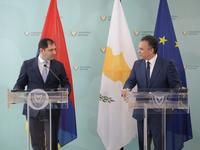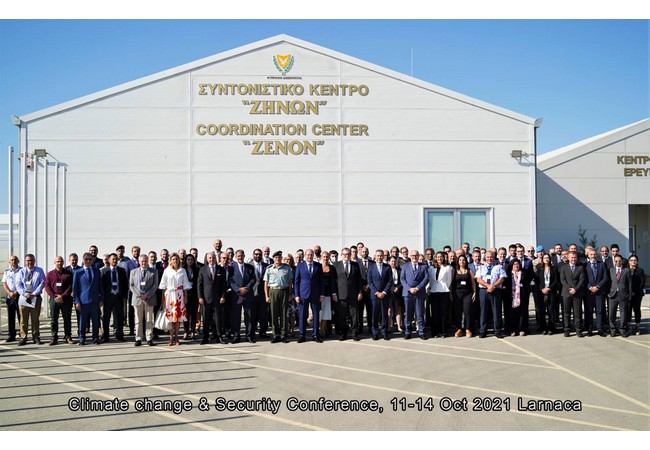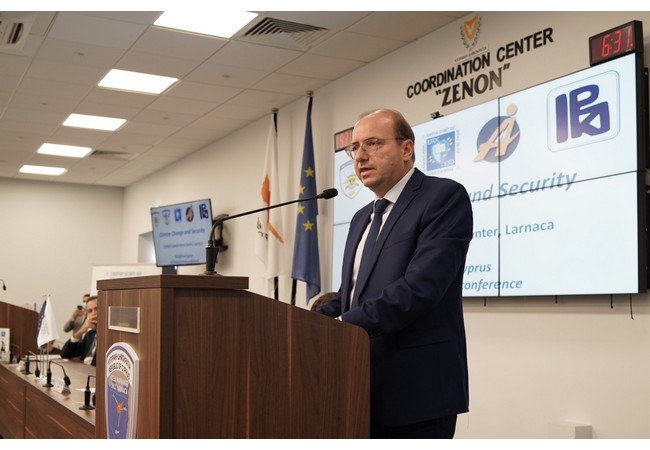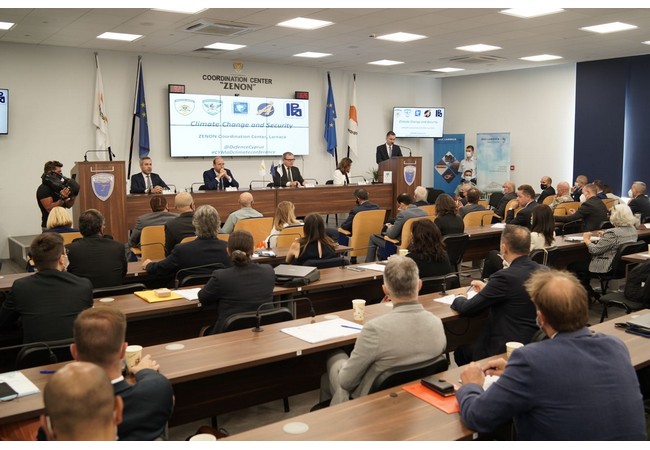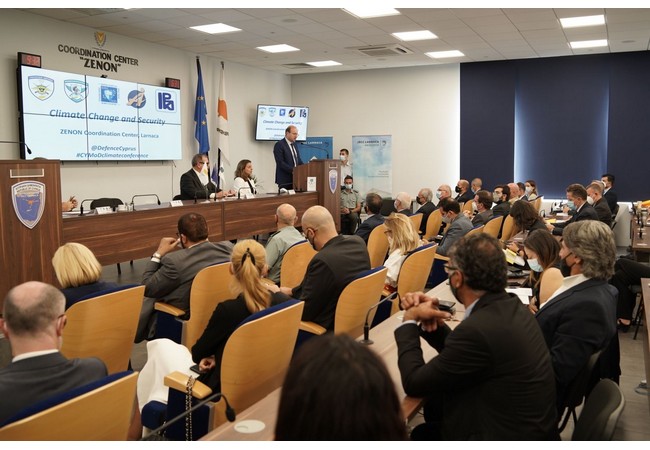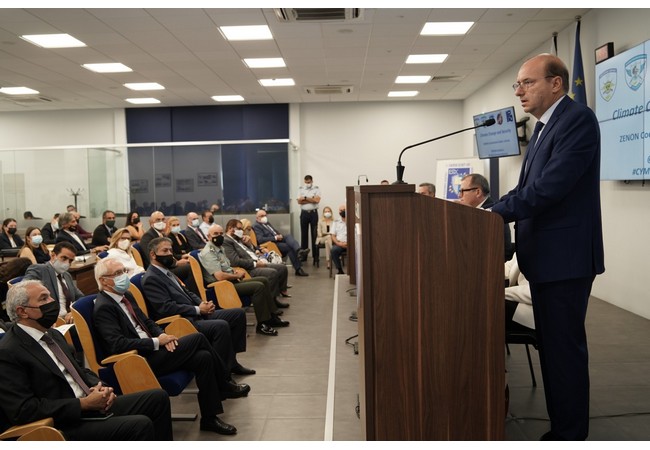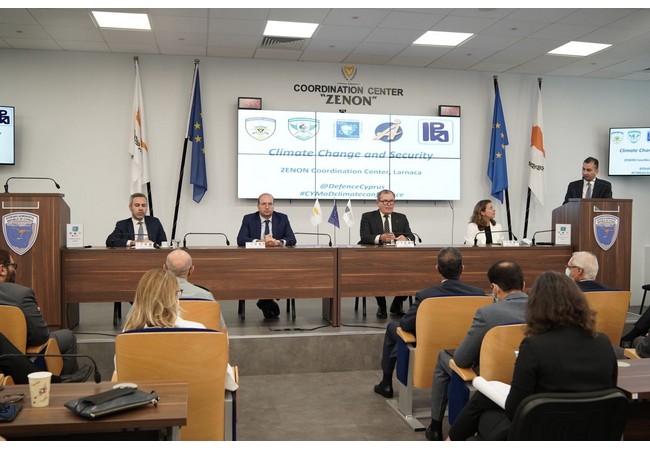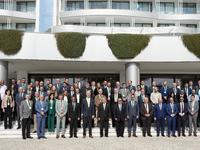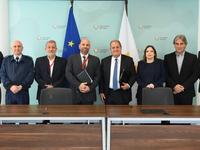Press Releases
11-10-2021 10:08
Opening remarks by the Minister of Defence, Mr Charalambos Petrides, at the Climate change and Security Conference
Hosting a conference on climate change and security could not have been timelier and more pertinent. As the international community is actively working in the run-up to COP26 in the coming weeks, the Conference we are inaugurating today, contributes to the debate and global interest on this issue.
I would like to thank our Defence and Security Academy, as well as the European Security and Defence College, the Cyprus Institute and the Cyprus Academy of Public Administration for cordially supporting this Conference. Also, a warm thanks to our hosts here at the Zenon Coordination Centre – an ideal venue for enabling regional and multinational cooperation, exercises and training activities.
We are gratified for such a wide and distinguished participation and attendance. I want to especially welcome the Speakers and attendees who travelled to Cyprus. I am sure that the content of the conference will have an added value and will be an enriching experience. For that purpose, we are glad that the Ministry of Defence of Cyprus, by organising this Conference contributes to the discussion and facilitates the exchange of views, best practices, lessons learned in tackling climate change and promote security. Hopefully, it will also trigger future ideas for synergies leading to multinational collaboration and joint projects.
The Republic of Cyprus is mindful of the effects of climate change. Our region and neighborhood already witness the results of climate change and its impact on our natural environment and natural resources. That is why we advocate for the need for regional cooperation for mutually addressing and mitigating the effects of the climate crisis.
I would be remiss if I didn’t acknowledge the European Defence Agency’s valuable work in climate change and sustainable energy. Having the EDA Chief Executive present with us today, it gives me the opportunity to highlight the Agency’s unique role in assisting the Ministries of Defence of the EU Member States to promote collaborations, launch new initiatives and introduce solutions to improve defence capabilities. EDA’s role has been also significantly increased in supporting the Ministries to generate ideas for defence energy-related policies, strategies, action plans and project ideas.
It is a common perception that Defence has for long been the global innovation leader in military hardware with a number of direct and indirect impacts on a number of every day technological breakthroughs. However, this capability is not easily recognised and applied to environmental and energy challenges such as climate change and energy conservation. Energy savings can be beneficial to Defence, and Defence can contribute to address climate effects and protect the environment.
As the EU is now actively pursuing the implementation of its Climate Change and Defence Roadmap, it is evident that the strong nexus of security and defence with climate change is now featuring prominently.
Promoting sustainability in the armed forces is a win-win approach for the Defence sector, and Europe as a whole. In fact, the armed forces can reduce expenses in energy and would benefit of a greater availability of resources to key objectives from the operational point of view. This is of utmost importance, especially if we consider that it is estimated that the annual costs of energy consumption in Armed Forces in Europe is more than one billion euro and that Armed Forces are the wider public owner of infrastructure.
In this context, it is important to underline that we have included in the National Energy and Climate Change Plan, our defence plans and measures to reduce energy consumption, increase energy efficiency and sharing of renewable energy, contributing in this respect to the wider efforts of Cyprus to meet its energy targets for 2030.
The Ministry of Defence of the Republic of Cyprus as a major employer, land user, and consumer of natural resources, acknowledges its environmental and social responsibilities as well as the importance of having a solid environmental and energy policy which underlines its ability to achieve high standards of environmental performance. The commitment of the Ministry to act as a leader in sustainable environmental and energy management is clearly presented in its Environmental Policy, which is implemented through its Environmental Strategic Plan.
That is why, as early as December 2005, the Cyprus Ministry of Defence established its Environmental Committee which in June 2006 published for the first time its Defence Environmental Policy.
The main innovative features of our Environment Action Plan include:
● Monitor and manage environmental and energy activities by applying and implementing a verified Environmental Management System (EMAS) in six major military camps in Cyprus. In the course of the conference, you will have the chance to visit one of these camps.
● Integration of Ecologically Sustainable Development (ESD) into the built environment, including the development of new facilities and refurbishment of older properties by establishing specific ESD principles and guidelines;
● Energy efficiency programs and development of Renewable Energy Sources (photovoltaic -PV) projects in military camps;
● Implementation of waste recycling programs in collaboration with GREEN DOT Cyprus, and hazardous and non-hazardous waste management programs and organic waste to energy programs in collaboration with the Ministry of the Environment;
● Programs and initiatives for the natural and cultural heritage protection;
● Dissemination activities to promote environmental and energy management among the MOD Cyprus personnel;
● Integration of the principles of environmental and energy efficiency purchasing into our procurement activities in line with the relevant Government Green Procurement Policy.
I know that there are still a lot of actions to be undertaken. However, I am also aware that we are determined to identify solutions and apply best practices, as well as exchange ideas and lessons learned to increase our energy resilience and autonomy with the support of the European Union’s institutions and agencies, and in close collaboration with the other EU member states, regional and international partners.
I wish every success to the Conference and I wish our guests an enjoyable stay in Cyprus.
EH/ECHR
Relevant Press Releases

19-04-2024 16:42
PIO e-mail Αlerts service is suspended

08-01-2024 10:41
Curriculum vitae of the new Minister of Defence, Mr Vasilis Palmas
